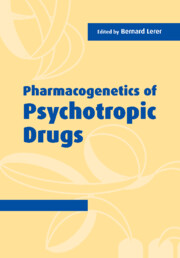Book contents
- Frontmatter
- Contents
- List of contributors
- Part I Introduction
- Part II Clinical background and research design
- 2 From pharmacogenetics to pharmacogenomics of psychotropic drug response
- 3 Neuropsychopharmacology: the interface between genes and psychiatric nosology
- 4 Methodological issues in psychopharmacogenetics
- 5 Statistical approaches in psychopharmacogenetics
- Part III Molecular background
- Part IV Pharmacokinetics
- Part V Specific psychotropic drugs and disorders
- Part VI Pharmacogenetics and brain imaging
- Part VII Industry perspectives
- Index
4 - Methodological issues in psychopharmacogenetics
from Part II - Clinical background and research design
Published online by Cambridge University Press: 20 August 2009
- Frontmatter
- Contents
- List of contributors
- Part I Introduction
- Part II Clinical background and research design
- 2 From pharmacogenetics to pharmacogenomics of psychotropic drug response
- 3 Neuropsychopharmacology: the interface between genes and psychiatric nosology
- 4 Methodological issues in psychopharmacogenetics
- 5 Statistical approaches in psychopharmacogenetics
- Part III Molecular background
- Part IV Pharmacokinetics
- Part V Specific psychotropic drugs and disorders
- Part VI Pharmacogenetics and brain imaging
- Part VII Industry perspectives
- Index
Summary
Keywords
- Type
- Chapter
- Information
- Pharmacogenetics of Psychotropic Drugs , pp. 57 - 71Publisher: Cambridge University PressPrint publication year: 2002

